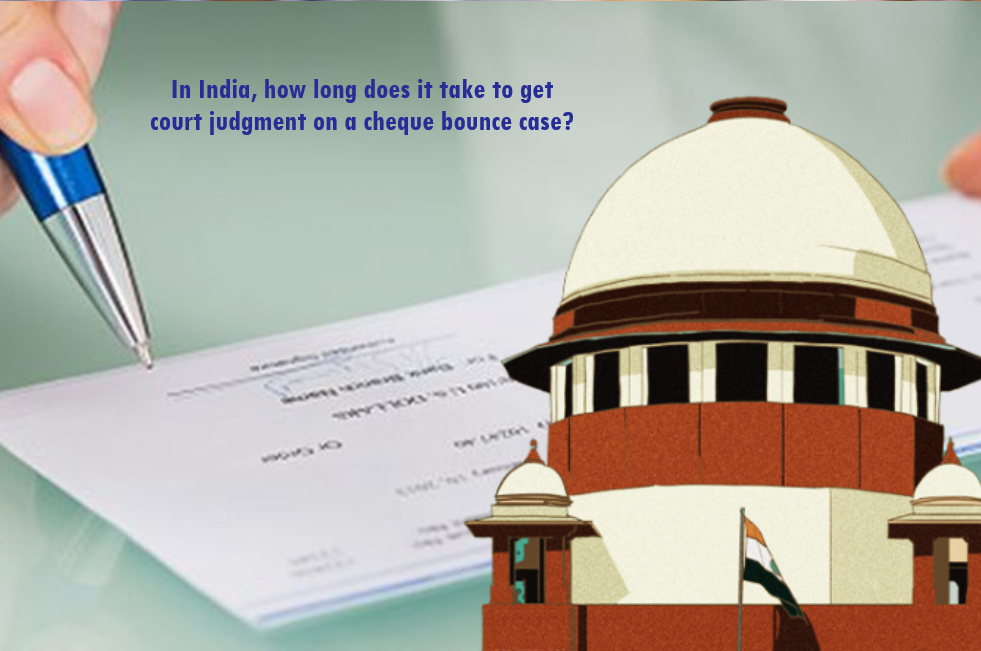Have you ever wondered how long it takes for a court to make a decision when someone writes a check, and it bounces? Why not start by making it simple and understandable in your own language? First of all, in India, when a check bounces, it’s called a “Cheque Dishonour Matter.” Fancy words, right? Stop worrying because we have brought the best solution for you who will tell you how much time it took for the court to get rid of our problem and if you’re in Delhi, we might also peek into the role of a “Cheque Dishonour Matters Lawyer in Delhi.”
Understanding the Basics
Okay, let’s start at the beginning. You write a check to someone, thinking there’s enough money in your account. But, oops! Turns out, there isn’t. Now, the person you wrote the check to can’t get the money, and they are not happy about it. So, after getting tired and defeated, in such a situation, he will knock the door of the court.
-
Step 1: Filing a Complaint
The first thing that happens is the person who got the bouncy check goes to the court and files a complaint. This is like saying, “Hey, something’s not right, and I need the court to look into it.” In legal terms, this is where the journey of the Cheque Dishonour Matter begins.
-
Step 2: The Court Takes a Look
Now, the court doesn’t just jump to conclusions. The court, in its own way, will look deeply into every aspect which is actually the root of this problem. It’s like when your teacher checks your homework to see if you did everything right. For your convenience and simplicity, let me tell you that in the legal world it is known as Admission and Denial.
In accordance with its procedure, this case will also be handled properly, it will look at every fact that is related to it and will tell you whether any more evidence related to it is required or not. If they think there’s a case, they’ll ask the person who wrote the bouncing check to explain themselves. This is kind of like when your parents ask you why you didn’t finish your chores – you have to give your side of the story.
-
Step 3: Summons and Notices
After the court has had a good look at everything, they might send out something called “summons” or “notices.” These are like official letters that tell everyone involved, “Hey, we’re serious about figuring this out.” If you’re in Delhi and caught up in all this, you might be thinking about finding a “Cheque Dishonour Matters Lawyer in Delhi” around this time.
-
Step 4: Trial Time
Now, this is where things get a bit more serious. To further proceed with the trial for this, the court sets a date for it. It’s like scheduling a big meeting where everyone gets together to talk about what happened. Both parties – the person who wrote the bouncing check and the one who received it – get a chance to present their side of the story.
This trial can take some time because the court wants to make sure they understand everything. During the whole procedure of trial, may be they ask some questions, look at evidence again and again, and hear from witnesses if there are any. It’s a bit like a detective figuring out a mystery.
-
Step 5: Decision Making
Once the trial is done, the court takes some time to think things over. They don’t rush – they want to make sure they get it right.
In legal terms, the court is making a verdict. This is their decision on whether the person who wrote the bouncing check is guilty or not. If they’re guilty, there might be some consequences – like having to pay the money they owe or facing other penalties.
-
Delays and Factors:
Now, let’s talk about something important. Depending on the case sorts, all of these things can take a certain amount of time to conclude. It’s not like ordering fast food – it takes time to go through all the legal stuff.
Sometimes, there are delays. Maybe someone needs more time to gather evidence, or the court has a lot of cases to handle. It’s like if you have made a great plan and then rain comes and spoils the whole pla, and you have to change your plans. Courts have their own schedule, and sometimes things take longer than expected.
The diversity and complexity of the case also matters a lot. If it’s a simple bouncing check situation, it might get resolved faster. But if there are lots of twists and turns, it can take more time.
Role of a Cheque Dishonour Matters Lawyer in Delhi:
If you’re in Delhi and dealing with a bouncing check case, you might be thinking about getting some help. A lawyer who specializes in these matters can be like a guide through the legal maze.
A Cheque Dishonour Matters Lawyer in Delhi knows the ins and outs of the local laws. The lawyer can help you with understanding what’s happening, proper guidance to you through the legal process, and ensure you do not miss anything which is relatable and essential for this case.
Think of them as your legal superhero – they swoop in to make sure you have the best chance of a fair outcome. Your Cheque dishonour matters lawyer in Delhi has a strong understanding of how to present your case to the court, what important documents may court need, the timing, and so on. It’s like having a coach for a sports game – they know the rules, and they help you play your best.
Conclusion:
The time it takes for a court to give its verdict on a check bounce case in India can vary. Filing a complaint, going through trials, and waiting for a decision – these are the three pillars of this case which are linked to each other for the decision in the case. If you’re in Delhi and caught up in all this, having a Cheque Dishonour Matters Lawyer by your side can make things a bit smoother.
Remember, the legal world might seem complicated, but it’s like any other challenge – take it one step at a time, and you’ll get through it. So, the next time you hear about a bouncing check, you’ll know that behind the legal jargon, there’s a simple process of figuring things out.







